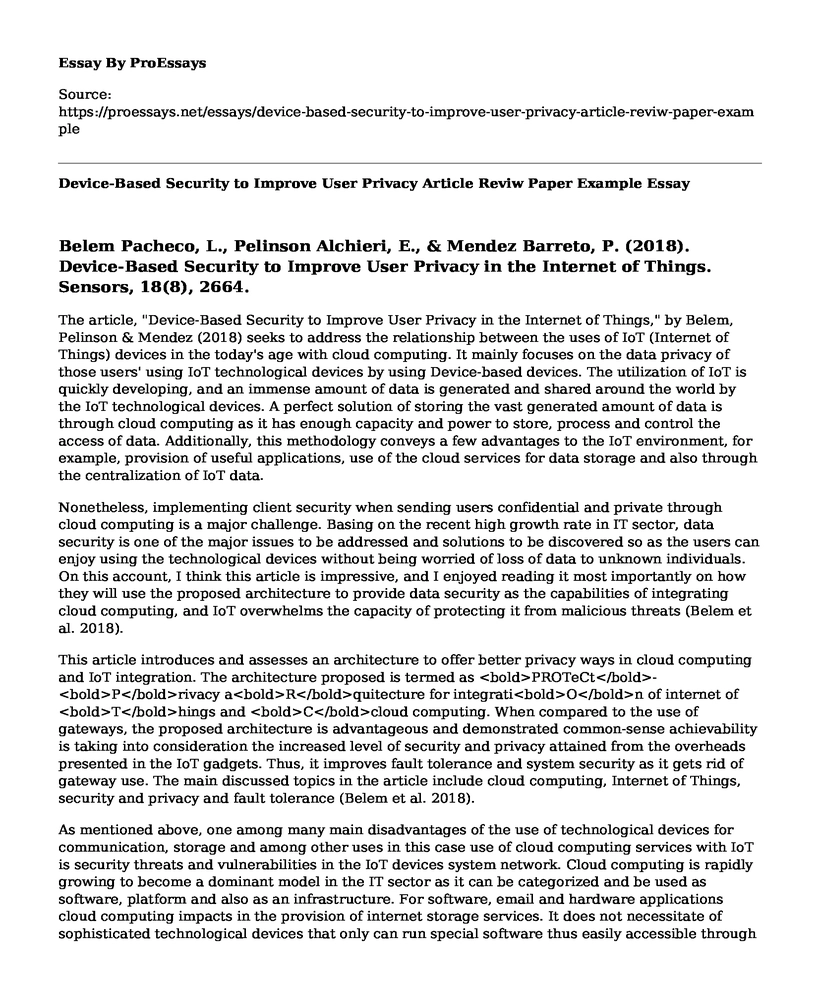Belem Pacheco, L., Pelinson Alchieri, E., & Mendez Barreto, P. (2018). Device-Based Security to Improve User Privacy in the Internet of Things. Sensors, 18(8), 2664.
The article, "Device-Based Security to Improve User Privacy in the Internet of Things," by Belem, Pelinson & Mendez (2018) seeks to address the relationship between the uses of IoT (Internet of Things) devices in the today's age with cloud computing. It mainly focuses on the data privacy of those users' using IoT technological devices by using Device-based devices. The utilization of IoT is quickly developing, and an immense amount of data is generated and shared around the world by the IoT technological devices. A perfect solution of storing the vast generated amount of data is through cloud computing as it has enough capacity and power to store, process and control the access of data. Additionally, this methodology conveys a few advantages to the IoT environment, for example, provision of useful applications, use of the cloud services for data storage and also through the centralization of IoT data.
Nonetheless, implementing client security when sending users confidential and private through cloud computing is a major challenge. Basing on the recent high growth rate in IT sector, data security is one of the major issues to be addressed and solutions to be discovered so as the users can enjoy using the technological devices without being worried of loss of data to unknown individuals. On this account, I think this article is impressive, and I enjoyed reading it most importantly on how they will use the proposed architecture to provide data security as the capabilities of integrating cloud computing, and IoT overwhelms the capacity of protecting it from malicious threats (Belem et al. 2018).
This article introduces and assesses an architecture to offer better privacy ways in cloud computing and IoT integration. The architecture proposed is termed as <bold>PROTeCt</bold>-<bold>P</bold>rivacy a<bold>R</bold>quitecture for integrati<bold>O</bold>n of internet of <bold>T</bold>hings and <bold>C</bold>cloud computing. When compared to the use of gateways, the proposed architecture is advantageous and demonstrated common-sense achievability is taking into consideration the increased level of security and privacy attained from the overheads presented in the IoT gadgets. Thus, it improves fault tolerance and system security as it gets rid of gateway use. The main discussed topics in the article include cloud computing, Internet of Things, security and privacy and fault tolerance (Belem et al. 2018).
As mentioned above, one among many main disadvantages of the use of technological devices for communication, storage and among other uses in this case use of cloud computing services with IoT is security threats and vulnerabilities in the IoT devices system network. Cloud computing is rapidly growing to become a dominant model in the IT sector as it can be categorized and be used as software, platform and also as an infrastructure. For software, email and hardware applications cloud computing impacts in the provision of internet storage services. It does not necessitate of sophisticated technological devices that only can run special software thus easily accessible through various web browsers like Mozilla Firefox, Microsoft Internet Explorer among others. It cuts down hardware and support need also offers anytime anywhere collaboration therefore efficient and effective. On the other hand, availability and security are still major potential cloud computing drawbacks that affect most users relying on its services (Lynch, 2016).
Cloud computing is changing how I work in many ways given most people nowadays depends on technology greatly. To mention a few, cloud computing has changed my working through limitless real-time collaboration and also through the provision of easy organization and storage of data that can be retrieved easily. The cloud changed working collaboration manner. Presently, different clients can add various ideas to a similar task at the same time irrespective of the distance between them. They can leave remarks, make inquiries, and make recommendations and changes. Thus effective and efficient. Despite all the advantageous impacts of cloud computing and the rapid growth rate of IoT use, data security is the main concerning issue and is discussed in depth in the article.
References
Belem Pacheco, L., Pelinson Alchieri, E., & Mendez Barreto, P. (2018). Device-Based Security to Improve User Privacy in the Internet of Things. Sensors, 18(8), 2664. Retrieved from; http://eds.a.ebscohost.com.libraryresources.columbiasouthern.edu/eds/detail/detail?vid=2&sid=ab74036f-7b5d-4e80-ab5a-a92c71384e4c%40sdc-v-sessmgr04&bdata=JnNpdGU9ZWRzLWxpdmUmc2NvcGU9c2l0ZQ%3d%3d#AN=131400712&db=a9h
Lynch, J. (2016). What Are the Benefits and Drawbacks of Cloud Computing? Retrieved from; https://www.techsoup.org/support/articles-and-how-tos/what-are-the-benefits-and-drawbacks-of-cloud-computing.
Cite this page
Device-Based Security to Improve User Privacy Article Reviw Paper Example. (2022, Dec 21). Retrieved from https://proessays.net/essays/device-based-security-to-improve-user-privacy-article-reviw-paper-example
If you are the original author of this essay and no longer wish to have it published on the ProEssays website, please click below to request its removal:
- Paper Example on Marketing: Diffusion of Innovation Curve, Product Life Cycle, and Product Flux
- Security of Web-Enabled Small Devices - Essay Example
- New Technologies in Petroleum and Gas Industries
- Paper Example on Relationship Between Data, Information, and Knowledge
- Essay Example on Robots Dreaming of Human Life: Philip K. Dick's Do Androids Dream
- Essay Example on BNL Nuclear Reactor: Controversy & Shutdown
- Essay Example on Amazon Fire Stick: Enhancing User Experience with Internet of Things







